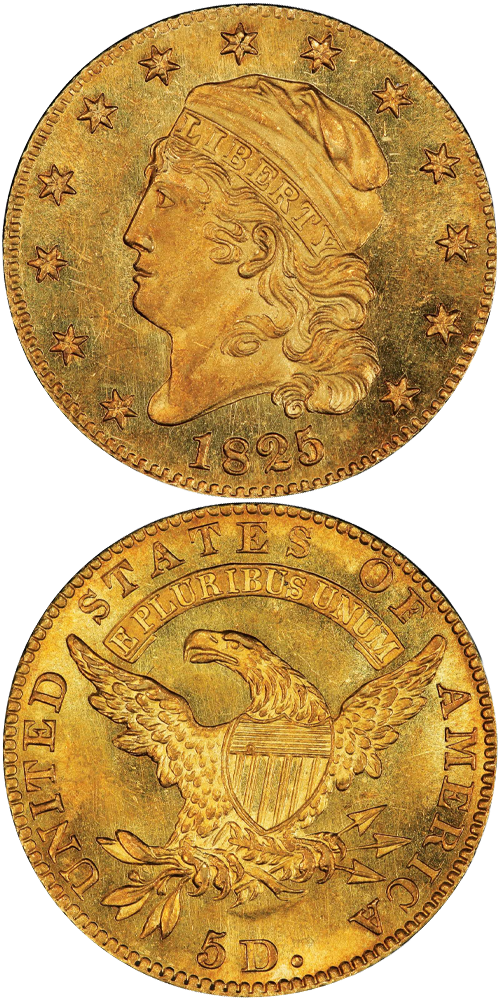1825/4/1 Capped Head Left Half Eagle
Circulation Strike: All 1825-dated half eagles exhibit traces of an overdate, with three distinct varieties known. With only 25 to 30 examples believed extant in all grades, the 1825/4/"1" BD-1 is certainly among the more elusive varieties of this type. Per numismatic tradition, the underdigit on this obverse die is a 1, although Walter Breen was one of the first researchers to suggest that it is actually the remnants of a partially effaced 4. More recent scholarship by John Dannreuther seems to confirm Breen's theory that the underdigit on this die is actually a partially effaced 4. The PCGS attribution of 1825/4/1 seems to be a compromise that allows adherents to both the traditional 1825/1 theory and the more modern 1825/Partial 4 attribution to readily identify examples of this variety.
Proof Strike: During the 1820s, the marketing of yearly Proof coinage to the wider numismatic market was still three decades in the future for the United States Mint. This is not surprising as coin collecting in this country did not experience its first significant growth in popularity until the late 1850s. Earlier, there were few collectors, most of whom were concentrated in the larger cities of the Northeast, most notably Philadelphia, where proximity to the Mint allowed for the formation and maintenance of close relationships. These ties resulted in the production of small numbers of Proof coins in certain years expressly for distribution to collectors. Others were made for official purposes. In many instances specimens were made at multiple times during a given year, further evidence that they were coined on demand to meet specific needs or in response to special requests.
Since mintages of pre-1859 Proof coinage were not recorded by Mint personnel, the exact number of Proof half eagles struck in 1825 will never be known. Given the special conditions under which these coins were produced and distributed, however, the number extant probably (closely) equates to the mintage. All known specimens of this issue were struck from the same die pair, which is now cataloged as JD-1 and BD-1. This is the more readily obtainable die pairing of the circulation strike 1825 half eagle, in fact, although even in that format this attribution is rare with only 25 to 30 examples known (per John W. Dannreuther, Early U.S. Gold Coin Varieties: A Study of Die States, 1795-1834, 2006). It is an overdate, and a dramatic one at that, whose classification has undergone revision in recent years. Once thought to be merely an 1825/4, Saul Teichman expanded this to 1825/4/1 when he discovered that the obverse die had originally been dated 1821. Such repurposing of dies was commonplace in the early United States Mint as a shortage of high-quality steel for die preparation was at odds with the need to meet demands of gold and silver bullion depositors in a timely manner.
Interestingly, the second die pairing of the 1825 half eagle is also an overdate. BD-2 shares its reverse with BD-1, but the obverse is a different die, 1825/4 only, with the digits in the date more evenly and closely spaced. With only two examples known, this variety is also a landmark rarity. The finer of these is the Earle-Eliasberg-Pogue specimen that was long considered to be a Proof. Modern numismatic scholarship, however, has determined it to be a deeply prooflike circulation strike. Currently certified MS-64 by PCGS, it realized $940,000 in our May 2016 Pogue IV sale.
The example to the left was sold by Stack's Bowers Galleries in the Summer 2022 Global Showcase Auction, where it realized $4,080,000.






